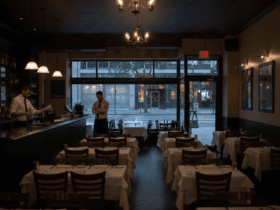Investing in a restaurant can be a thrilling yet daunting endeavor for entrepreneurs and aspiring restaurateurs alike. Whether you’re venturing into the culinary world for the first time or expanding your restaurant empire, understanding the key factors that influence success in this industry is paramount. From securing funding to navigating the complexities of restaurant management, every decision can significantly impact the profitability and longevity of your venture and is important to restaurant investment. In this comprehensive guide, we delve into the top nine factors that restaurant owners must consider when investing in a restaurant.
From identifying the right investors to evaluating the potential profitability of your venture, we’ll explore essential insights tailored to empower you on your journey towards restaurant investment success. Let’s dive in!
1. Understanding Your Target Market:
Before investing in a restaurant, it’s crucial to conduct thorough market research to understand your target audience. Analyze demographics, preferences, and dining trends in your locality to determine the type of restaurant that will resonate with potential customers. Consider factors like cuisine preferences, dining habits, and pricing expectations to tailor your concept effectively.
2. Financial Planning and Budgeting:
Creating a solid financial plan is essential for the success of any restaurant investment. Calculate startup costs, including lease or purchase of property, equipment, licenses, permits, and initial inventory. Develop a detailed budget that accounts for operating expenses, payroll, marketing, and contingencies. Consider consulting with financial experts or experienced restaurateurs to ensure your financial projections are realistic and sustainable.
Must Read: How can Restaurants Benefit from Customer surveys?
3. Securing Funding and Investment Partners:
Identifying sources of funding is a critical step in restaurant investment. Explore options such as traditional bank loans, angel investors, venture capitalists, or crowdfunding platforms. Present a compelling business plan highlighting your concept, market analysis, financial projections, and potential ROI to attract investors. Collaborating with strategic partners who bring expertise and resources can also enhance your restaurant’s success.
4. Location and Property Selection:
Choosing the right location for your restaurant can significantly impact its foot traffic and profitability. Evaluate factors like visibility, accessibility, parking availability, surrounding demographics, and competition in the area. Negotiate favorable lease terms or conduct thorough due diligence if purchasing property to ensure it aligns with your business goals and target market.
5. Menu Development and Conceptualization:
Crafting a unique and appealing menu is key to attracting and retaining customers. Consider your target audience’s preferences, dietary trends, and local culinary influences when designing dishes. Develop a cohesive concept that reflects your brand identity and sets you apart from competitors. Conduct menu tastings and gather feedback to refine your offerings and ensure consistency in quality and flavor.
6. Staffing and Training:
Building a skilled and motivated team is essential for delivering exceptional dining experiences. Hire qualified chefs, kitchen staff, servers, and front-of-house personnel who align with your restaurant’s vision and values. Provide comprehensive training programs to ensure staff members are proficient in food preparation, customer service, safety protocols, and menu knowledge. Foster a positive work culture that promotes teamwork, professionalism, and continuous learning.
7. Marketing and Branding Strategies:
Developing effective marketing and branding strategies is crucial for attracting customers and building brand loyalty. Utilize digital marketing channels such as social media, email campaigns, and search engine optimization (SEO) to reach your target audience and promote your restaurant’s unique selling points. Leverage partnerships with local influencers, food bloggers, and media outlets to generate buzz and increase visibility. Implement loyalty programs, special promotions, and experiential marketing initiatives to engage customers and encourage repeat business.
8. Operational Efficiency and Customer Experience:
Optimizing operational processes is key to delivering a seamless and memorable dining experience. Implement technology solutions such as point-of-sale (POS) systems, reservation platforms, and inventory management software to streamline operations and improve efficiency. Focus on maintaining high standards of service, food quality, cleanliness, and ambiance to exceed customer expectations and foster positive reviews and word-of-mouth referrals.
Must Read: The Perfect Restaurant Industry Analysis For Your Restaurant
9. Monitoring Performance and Adaptation:
Regularly monitor key performance indicators (KPIs) such as revenue, expenses, customer satisfaction, and online reviews to track your restaurant’s performance. Analyze data and feedback to identify areas for improvement and make informed decisions. Stay agile and adaptable in response to market trends, customer feedback, and industry developments to remain competitive and sustainable in the dynamic restaurant landscape.
By considering these nine factors comprehensively, restaurant owners can navigate the complexities of restaurant investment with confidence and increase their chances of long-term success in the vibrant and ever-evolving hospitality industry. Cheers to a successful restaurant investment journey!








Leave a Reply